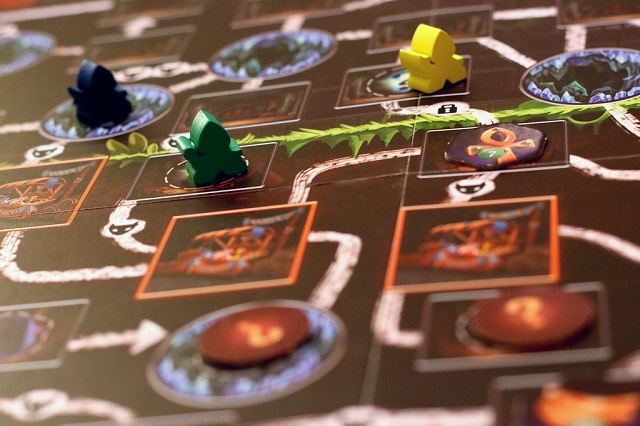
Deck-building games are becoming increasingly popular with the gaming community as they offer a unique and interactive way to play. They combine elements of strategy, luck and roleplaying, often resulting in engaging sessions of entertainment. There are many variations on the deck-building genre such as cooperative, competitive, and multi-player deck building games. Each offers its own set of challenges and rewards including player vs. player gameplay.
When it comes to designing a new game, there is no one-size-fits-all solution so it is important to consider the desired outcomes of Player vs. Player (PvP) gameplay in a deck-building game before deciding on the specifics of mechanics and storylines. To begin, some basic rules will need to be established in order to create structure and fairness for all players involved.
This includes things such as turn length, time limits for each action, etc. Once these foundational rules have been established then more complex details can be added at the discretion of the designer such as strategies each player or team should pursue or skills or abilities that can be unlocked by achieving certain win conditions or triggering specific events.
Having PvP gameplay as an option within a deck building game also requires considerations regarding reward systems for winning players which should incentivize skillful play while not allowing anyone player or team to become too powerful too quickly. Rewards could include exclusive cards useful within that particular game setting as well as bonus points and/or special conditions for future gameplay sessions.
Additionally there should be ways to help keep players engaged such as time limits on opponents’ turns, new card sets becoming available over time and leaderboard rankings that tell players how their performance compares with others still playing regularly. All these considerations can help make an enjoyable overall experience for everyone involved in PvP gameplay with any given Deck Building Game scenario.
DIY Deck-Building Card Creation & Design
Deck-building games are interactive card games which challenge players to compete against each other using their individual decks. Deck-building games are widely popular in the board game community and feature a variety of different themes, from fantasy adventure to sci-fi space battles.
One of the main advantages of playing a deck-building game is that you get to create your own personalized deck with unique cards within its theme, which gives you the chance to experiment and customize your playstyle. This provides a much more immersive experience and drives strategic thinking as players can craft their decks for certain strategies, depending on what type of game they’re playing and what they’re trying to achieve.
When it comes to creating your own cards for a deck-building game, there are many tutorials online that can guide players through the process. Here is a list of tips for designing successful cards:
- Learn the mechanics – familiarize yourself with the general mechanics and flow of a typical deck-building game
- Choose an iconic design – be sure to select a theme for your cards that will help give them an iconic look
- Formulate card powers – decide on how powerful each card should be relative to others in the set
- Focus on balance – craft cards so they complement each other without becoming overpowered
- Test & adjust – make sure to test out decks before settling on any final designs
Creating attractive, well designed cards is very important when it comes to making enjoyable, interesting decks for a deck building game. While it may take some practice at first, by following these steps even beginners can join in on the fun. Consider enlisting graphic design software like Adobe Photoshop or InDesign in order to create high quality card images that will stand out amongst opponents’ creations.
Take time to think about various possible effects that could be incorporated into your designs – adding small details like arrows or lines between action icons could make all the difference when it comes time actually use them in-game. Additionally, consider adding text labels or descriptions on how certain abilities may interact with one another when stacked together.
Lastly, ensure that you add clear value numbers over pretty aesthetic art – this way players won’t lose track of how strong each card really is during performance.
Pros and Cons of Different Deck-Building Game Types
Deck-building games are incredibly popular today, and they come in many types, size and complexities. The two most common variations you’ll find are collectible card games (CCGs) and Living Card Games (LCGs). Each type has its own unique strengths and weaknesses, so it’s best to understand them before deciding which one is right for you.
Collectible Card Games
CCGs generally involve players using the same set of starter cards to build their own customized decks from a large selection of packs that can be purchased separately. The major pros of these games have to do with variety and excitement. With CCG decks, you’d never run out of cards to explore as they keep releasing new sets with different kind of characters and capabilities.
This means that your gameplay can constantly shift overtime as you explore different strategies with the cards you acquire. However, the drawback is that CCGs tend to be more expensive due to the need for regular purchases with each new expansion.
Some people may also not like the randomness associated with booster packs as there’s no guarantee what kind of cards will end up in your possession – some people would much rather curate their collection themselves for greater control over playstyle.
Living Card Games
LCGs are more focused on story-driven narratives than CCGs typically are; expansions come out in a planned manner so you know exactly which cards will be coming ahead of time. In addition, while each standard set contains enough variety for multiple strategies, additional expansions offer even more content which continue to build on past themes allowing for gamers to really sink into exploration of atypical game tactics through these experiences.
On the other hand, LCGs often miss out on the excitement aspect since it doesn’t have blind drawing or surprises in store when opening a booster pack. Another con associated with this style of game playing is that expansions may not come out regularly enough for some players who want constant fictional narrative progression in their gaming life.
Finding What Works For You
Ultimately deciding between them can be tricky depending on how important certain aspects might be to any given person such as escalating levels of complexity vs limited but efficient depth or cost considerations depending on needs.
Understanding how CCG variations create excitement versus story driven elements in LCG styles could help inform any ultimate decision making here – both are fun in their own right and require thoughtful considerations one should make prior to investing unless truly undecided at which a good practice might simply picking up one version with an initial cap cost investment prior officially deciding between either alternatives.
Deck-Building Strategies for Beginners
Deck-building games are popular amongst gamers. They have become especially prevalent in the context of card and board games alike. These types of games require players to construct their own individual decks, often with the help of guidance or outside assistance from an expert or veteran player.
Players must assemble a deck that best suits their playing style and preferences. To be successful in a deck-building game, it is essential that players understand basic strategies and how to utilize their cards effectively for maximum efficiency and success during each match. Following is a list of strategies to help beginners when embarking on their first deck-building journey:
- Choose the Right Cards: Before constructing your deck’s theme, it is important to think about which cards are most useful for accomplishing your goals within the game. Take some time to research various cards available and get an understanding of what combinations fit together well for any particular moment.
- Focus on Defense: As with any competitive game, it is always important to bear in mind that defense can be just as powerful as offense when building a successful deck. Focusing on low cost defensive cards will allow you to save your powerful cards until you really need them later in the match.
- Understand Strengths & Weaknesses: Once you’ve settled on which cards are best for your playing style, it’s important to know both the strengths and weaknesses of each card. To gain this understanding, players should read through each card’s details carefully while also keeping an eye out for bonuses or penalty effects associated with other cards when applicable.
- Experiment With Card Combinations: After gaining insight into the range of options available with one’s collection of cards, trial and error tactics helps iterate towards optimal combinations that lead to overall success over longer play sessions. This involves taking risks with new pairings as well as understanding why certain combinations can win or lose games.
- Know Your Opponent’s Capitalization Strategies: Every player will have different approaches at capitalizing on successes during gameplay – whether through drawing bonus draw phases due to mana crystals, casting extra spells from well timed card combos, allocating extra life points from combat damage dealing creatures etc. It is important for players understand these plays so they can strategize around them.
How to Properly Implement Multiplayer Deck-Building Games
Multiplayer deck-building games involve playing cards against other players with the goal of constructing a stronger deck than that of the opponents. The cards are bought with resources, such as gold or gems, and can either be used to attack the opponent’s deck or help build up one’s own. Such games are becoming increasingly popular among gamers thanks to their unique combination of strategy and resource management.
1. Utilize Balanced Card Types: It is important to include a variety of card types in any multiplayer deck-building game. A successful design should include both cards that are focused on offense and those which offer defensive capabilities. This ensures that all players have access to the tools necessary to build a powerful and resilient deck. Additionally, including different card variations allows for more creative strategies and playstyles for more intricate matches.
2. Offering Multiple Resources: Allowing for multiple resources in the game design further expands strategic possibilities-as opposed to relying solely on gold or other single sources-and makes deck construction much more interesting for players. Players can use a combination of resources such as crystals, mana, honor points, or spell books to build decks according to their individual play styles and goals.
3. Provide Different Types of Effects & Bonuses: Giving players access to a wide range of bonuses is essential when creating effective multiplayer experiences. Not only do bonuses serve as an incentive for victory, but they also force players into making strategic decisions regarding construction because such rewards can help them gain an edge over their opponents in future games. Furthermore, combining effects from different card types creates even greater potential flexibility during builds and helps keep games fresh.
4. Keep Track of Player Statistics: An effective way to engage in replayability is by implementing stat tracking systems so that players can go back at any time and analyze their past performance as well as assess what strategies could be used effectively for future played matches. This also allows players to study enemy tactics since data will show which cards were most frequently used by opponents.
5. Enhancing Rewards Systems: Rewarding high performing players offers them additional motivation like unlocking achievements or free packs upon completion if specific objectives were accomplished using certain decks or playing methods – this encourages them to try new things out and further challenge themselves in order to level up their gaming profile.
To add an even deeper layer, consider introducing permanent powerups which may provide bonuses depending on how successfully matches were completed within set periods; this would allow users who enjoyed the game enough still continue progressing without having worry about losing progress when taking breaks from it.
Cultural/Regional Variations in Deck-Building Games
Deck-building games describe a broad range of card-based tabletop games that focus on deck construction, offering players an everchanging experience. In these games, the cards acquired during game progression often provide players with an active sense of choice as they construct their expanding personalized decks. What’s more, many contemporary hybrid versions present players with even more interesting rules and opportunities while stepping away from any sort of linear style or objective finish line.
In some ways, however, it is essential to point out how certain regions or cultures may interpret this core theme in slight yet defining variations. One interesting example of regional interpretation can be found in Korea wherein popular tabletop games hold a drastically different attitude than those elsewhere around the world; for one thing, most decks employ substantially less strategic management as well as fewer blocking interactions between two or more opponents when compared to other countries.
Furthermore, Korean deck-building games tend to focus on combination plays featuring high level risk and reward plays rather than simply managing a bankroll or adding cards to a set deck like most European countries would favor.
Though regional variation does not necessary dictate quality nor playability in this genre of tabletop gaming, There are clearly unique and sometimes subtle aspects among various nations that can fill unique roles when designing player immersion for modern titles. In the case of Japan for example this could mean adding elements of permanence into certain card effects, indicating real significance and valuation on particular items when compared to Western versions which generally try keep gameplay fast and fluid.
This adds yet another layer to curious discovery where elements within each culture shape what is possible within particular global markets while also providing designers with additional freedoms when seeking to create something entirely new once all nuances have been considered.
Merchandising & Branding Deck-Building Games
Merchandising and branding are both important tasks when it comes to launching a successful deck-building game. With the right strategic approach, you can grow your audience and achieve success with your business venture. Here are some key strategies that you should consider:
Create High Quality Content
Creating informative content and videos around your deck-building game is a great way to generate interest in it. You should create content that showcases the cards, art, mechanics, and strategies for playing the game effectively. This will help potential customers gain a better understanding of how the game works and play it more confidently. Additionally, this type of content can also help build anticipation for upcoming releases or expansions.
Engage Your Audience Through Social Media
Utilizing social media platforms such as Facebook, Twitter, Instagram, etc. is an effective way to engage with existing customers and reach new potential players. Posting polls asking fans what they think about different cards or mechanic is an easy way to get feedback from them while creating opportunities for discussion among players. Additionally, social media offers great promotional possibilities since you can advertise upcoming product launches or giveaways through these outlets as well.
3 Leverage Influencers & Streamers
Finding influencers within the gaming community (or outside of it) who are keen on playing your deck-building game is an excellent method of expanding your target audience. You can work with these influencers to create streaming events where they play the game using their own decks or participate in tournaments featuring other players’ decks which would undoubtedly be enticing to watch for their followers – leading them closer towards making a purchase themselves.
Collaborations like these would provide great exposure for your product as well as instill trust in its quality due to the people recommending it.
- Create high quality content
- Engage customers with social media
- Leverage influencers & streamers
Tactical & Complex Strategies for Deck-Building Games
Deck-building games are an increasingly popular type of board game. These games involve combining a variety of individual cards into a deck which is then used to compete against other players and their decks. Deck building games involve tactical decisions when selecting cards to play with, as these have significant impact on the chances of winning.
The process of deck-building involves complex strategies that require careful thought and planning. One such strategy is emphasizing synergy between cards in your deck – this means choosing cards that, when combined together, create powerful combinations that give you an edge in the game. Furthermore, some cards affect the overall atmosphere of the game and can be used to manipulate the flow of turns going forward; these should be particularly considered when choosing which cards to include in your deck.
In addition, certain aspects of the game should also be taken into consideration when building a successful deck. What are some effective strategies for drawing good hands with desirable card combination? What counters will effectively lower the probability of players winning or reduce their advantage?
And how many copies should be included in one’s own deck to maximize chances for success? Understanding these concepts during deck-building can give you an edge against your opponents and improve your chance of victory.
It is important to also look ahead at what type of strategy online opponents might use with their chosen decks; this requires constant awareness, as trends can change quickly from game to game. Developing skills such as being able to adapt quickly and correctly anticipating enemy moves can help provide additional advantages over fellow competitors.
Taking time out between games to think about played tactics or other methods employed by other players can further increase proficiency in competitive area, thus increasing one’s odds for success when playing deck-building games against others.




